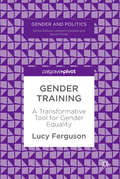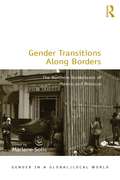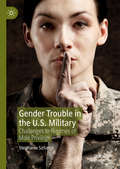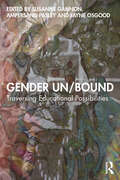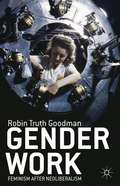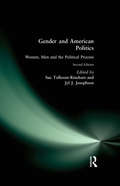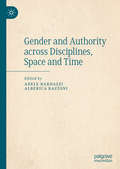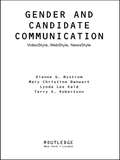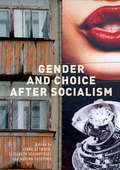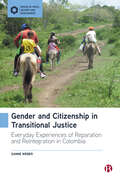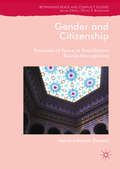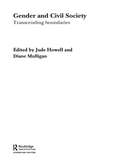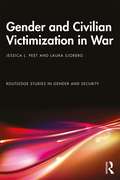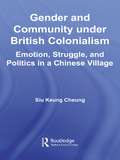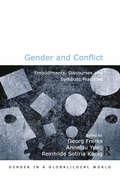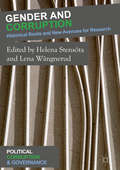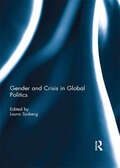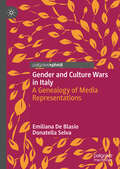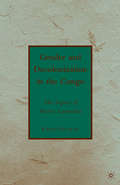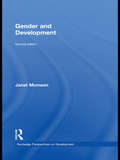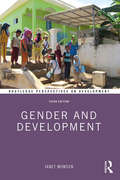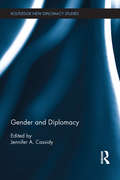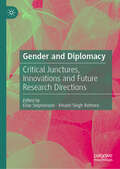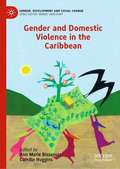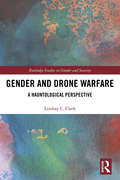- Table View
- List View
Gender Training: A Transformative Tool for Gender Equality (Gender and Politics)
by Lucy FergusonThis book develops a case for feminist gender training as a catalyst for disjuncture, rupture and change. Chapter 1 traces the historical development and current contours of the field of gender training. In Chapter 2, the key critiques of gender training are substantively engaged with from the perspective of reflexive practice, highlighting the need to work strategically within existing constraints. Questions of transformative change are addressed in Chapter 3, which reviews feminist approaches to change and how these can be applied to enhance the impact of gender training. Chapter 4 considers the theory and practice of feminist pedagogies in gender training. In the final chapter, new avenues for gender training are explored: working with privilege; engaging with applied theatre; and mindfulness/meditation. The study takes gender training beyond its often technocratic form towards a creative, liberating process with the potential to evoke tangible, lasting transformation for gender equality.
Gender Transitions Along Borders: The Northern Borderlands of Mexico and Morocco (Gender in a Global/Local World)
by Marlene SolisIn recent decades, women living in border cities have taken on new roles and have become one of the most vulnerable population groups; experiencing the effects of the economic crisis of the early 21st century and the consequent increase in social inequality and violence. This situation is particularly evident for the northern borderlands of Mexico and Morocco. The geopolitical position of these regions is defined by their strong existing asymmetry with their neighbouring countries: the United States, in the case of Mexico, and the Mediterranean European countries, in the case of Morocco. This book contributes to the understanding of current changes in the workplace, in family, in sexuality and sexual violence within the setting of the borderlands, through various studies addressing the manner in which these transformations are interpreted and experienced by women in everyday life and in their individual and collective agency.
Gender Trouble in the U.S. Military: Challenges to Regimes of Male Privilege
by Stephanie SzitanyiThis book investigates challenges to the U.S. military’s gender regime of hetero-male privilege. Examining a broad set of discursive maneuvers in a series of cases as focal points—integration of open homosexuality, the end of the combat ban on women, and the epidemic nature of military sexual assault within its units—Stephanie Szitanyi examines the contemporary link between gender and military service in the United States, and comprehensively analyzes forms of gendering produced by the military as an institution. Using feminist interpretivist methods to analyze an impressive combination of visual, textual, archival, and cultural materials, the book argues that despite policy changes since 2013 that may be positioned as explicit episodes of degendering, military officials have simultaneously moved to counteract them and reinforce the institution’s gender regime of hetero-male privilege. Importantly, these (re)gendering processes continue to prioritize certain forms of service and sacrifice, through which a specific version of masculinity—the masculine warrior—is continuously promoted, preserved, and cemented.
Gender Un/Bound: Traversing Educational Possibilities
by Jayne Osgood Susanne Gannon Ampersand PasleyThis collection is focused on the possibilities for unbinding people from gendered expectations in and around educational spaces, and accounts for the ways gender is reconstituted in and through education.This book presents a broad interpretation of gender, of what education might mean, and where educational experiences manifest. It explores more conventional schooling spaces to communally generated inclusive spaces, families and marginalised sites where gender is realised and contested. Alongside more familiar framings, the book incorporates decolonial and Indigenous contestations, theoretical innovations and methodological experiments that pry open the ways that gender binds and limits individuals. The chapters are organised in smaller conceptual clusters, offering multiple and overlapping reading paths according to the interests of the reader. A mapping of clusters and potential reading paths is included at the opening of the book, designed for instructors to expand course content.Written to enrich reading for preservice teacher education students and to challenge researchers, postgraduate and doctoral candidates, this book provides essential new perspectives on gender, education and the various ways in which they are un/bound together and apart.
Gender Work
by Robin Truth GoodmanRecently, labor has acquired a re-emergent public relevance. In response, feminist theory urgently needs to reconsider the relationship between labor and gender. This book builds a theoretically-informed politics about changes in the gendered structure of labor by analyzing how the symbolic power of gender is put in the service of neoliberal practices. Goodman traces the cultural contextualization of 'women's work' from its Marxist roots to its current practices. From the income gap to the gendering of industries, Goodman explores and critiques the rise of corporate power under neoliberalism and the ways and whys that femininity has become one of its principle commodities.
Gender and American Politics: Women, Men and the Political Process
by Sue Tolleson-Rinehart Jyl J JosephsonStudies of gender and American political life most often focus only on women. This book fills the gap by examining and comparing the roles and behavior of both men and women in political decision-making, public policy, and political institutions. Now updated and expanded, the book presents a full complement of empirical studies of real and imagined gender gaps. New to this edition are chapters on the media, legislative behavior, foreign policy, and the future of the gender dimension in American politics. The book is structured to parallel the typical course on the American political system.
Gender and Authority across Disciplines, Space and Time
by Adele Bardazzi Alberica BazzoniThis edited collection investigates the relationship between gender and authority across geographical contexts, periods and fields. Who is recognized as a legitimate voice in debate and decision-making, and how is that legitimization produced? Through a variety of methodological approaches, the chapters address some of the most pressing and controversial themes under scrutiny in current feminist scholarship and activism, such as pornography, political representation, LGBTI struggles, female genital mutilation, the #MeToo movement, abortion, divorce and consent. Organized into three sections, “Politics,” “Law and Religion,” and “Imaginaries,” the contributors highlight formal and informal aspects of authority, its gendered and racialized configurations, and practices of solidarity, resistance and subversion by traditionally disempowered subjects. In dialogue with feminist scholarship on power and agency, the notion of authority as elaborated here offers a distinctive lens to critique political and epistemic foundations of inequality and oppression, and will be of use to scholars and students across gender studies, sociology, politics, linguistics, theology, history, law, film, and literature.
Gender and Candidate Communication: VideoStyle, WebStyle, NewStyle (Gender Politics--Global Issues)
by Lynda Lee Kaid Dianne G. Bystrom Mary Christine Banwart Terry A. RobertsonFirst published in 2004. Routledge is an imprint of Taylor & Francis, an informa company.
Gender and Choice after Socialism
by Lynne Attwood Elisabeth Schimpfössl Marina YusupovaThe end of socialism in the Soviet Union and its satellite states ushered in a new era of choice. Yet the idea that people are really free to live as they choose turns out to be problematic. Personal choice is limited by a range of factors such as a person’s economic situation, class, age, government policies and social expectations, especially regarding gender roles. Furthermore, the notion of free choice is a crucial feature of capitalist ideology, and can be manipulated in the interests of the market. This edited collection explores the complexity of choice in Russia and Ukraine. The contributors explore how the new choices available to people after the collapse of the Soviet Union have interacted with and influenced gender identities and gender, and how choice has become one of the driving forces of class-formation in countries which were, in the Soviet era, supposedly classless. The book will of interest to students and scholars across a range of subjects including gender and sexualities studies, history, sociology and political science.
Gender and Citizenship in Transitional Justice: Everyday Experiences of Reparation and Reintegration in Colombia
by Sanne WeberThrough two Colombian case studies, Sanne Weber identifies the ways in which conflict experiences are defined by structures of gender inequality, and how these could be transformed in the post-conflict context. The author reveals that current, apparently gender-sensitive, transitional justice (TJ) and disarmament, demobilization and reintegration (DDR) laws and policies ultimately undermine rather than transform gender equality and, consequently, weaken the chances of achieving holistic and durable peace. To overcome this, Weber offers an innovative approach to TJ and DDR that places gendered citizenship as both the starting point and the continued driving force of post-conflict reconstruction.
Gender and Citizenship: Promises Of Peace In Post-dayton Bosnia-herzegovina (Rethinking Peace and Conflict Studies)
by Maria-Adriana DeianaThis book examines the remaking of women’s citizenship in the aftermath of conflict and international intervention. It develops a feminist critique of consociationalism as the dominant model of post-conflict governance by tracking the gendered implications of the Dayton Peace Agreement. It illustrates how the legitimisation of ethnonationalist power enabled by the agreement has reduced citizenship to an all-encompassing logic of ethnonational belonging and implicitly reproduced its attendant patriarchal gender order. Foregrounding women’s diverse experiences, the book reveals gendered ramifications produced at the intersection of conflict, ethno-nationalism and international peacebuilding. Deploying a multidimensional feminist approach centred around women’s narratives of belonging, exclusion, and agency, this book offers a critical interrogation of the promises of peace and explores individual/collective efforts to re-imagine citizenship.
Gender and Civil Society: Transcending Boundaries (Routledge Advances in International Relations and Global Politics)
by Jude Howell Diane MulliganOver the last two decades there has been considerable enthusiasm for the concept of civil society amongst researchers, practitioners and activists. Yet despite this enthusiasm for the concept, the gendered nature of civil society and the impact of feminist organizing on civil society has received minimal attention.This edited volume seeks to address this gap, and considers:* how the political environment and nature of the state shapes the way women organize, the issues they address, and their capacity to affect changes in state policies on gender* is the women's movement structurally different from other civil society organizations?* does the gender lens alter our vision of civil society?The chapters in this volume pursue two or more of these questions and cover a diversity of contexts, including the US, East and Central Europe, China, the Middle East, Africa, South East Asia, Central America and Chile. This book not only draws together the concepts of gender and civil society, but also adopts an international perspective, highlighting the diverse trajectories of women organizing in different country contexts and the historical, cultural and political specificities of civil society.
Gender and Civilian Victimization in War (Routledge Studies in Gender and Security)
by Laura Sjoberg Jessica L. PeetThis book explores the role of gender in influencing war-fighting actors’ strategies toward the attack or protection of civilians. Traditional narratives suggest that killing civilians intentionally in wars happens infrequently and that the perpetration of civilian targeting is limited to aberrant actors. Recently, scholars have shown that both state and non-state actors target civilians, even while explicitly deferring to the civilian immunity principle. This book fills a gap in the accounts of how civilian targeting happens and shows that these actors are in large part targeting women rather than some gender-neutral understanding of civilians. It presents a history of civilian victimization in wars and conflicts and then lays out a feminist theoretical approach to understanding civilian victimization. It explores the British Blockade of Germany in World War I, the Soviet ‘Rape of Berlin’ in World War II, the Rwandan genocide, and the contemporary conflict in northeast Nigeria. Across these case studies, the authors lay out that gender is key to how war-fighting actors understand both themselves and their opponents and therefore plays a role in shaping strategic and tactical choices. It makes the argument that seeing women in nationalist and war narratives is crucial to understanding when and how civilians come to be targeted in wars, and how that targeting can be reduced. This book will be of much interest to students of critical security, gender studies, war studies, and International Relations in general.
Gender and Community Under British Colonialism: Emotion, Struggle and Politics in a Chinese Village (East Asian Studies)
by Siu Keung CheungGender and Community Under British Colonialism is a study of continuity and change in village communities in the New Territories of Hong Kong, China.
Gender and Conflict: Embodiments, Discourses and Symbolic Practices (Gender in a Global/Local World)
by Georg Frerks Annelou YpeijThrough an in-depth analysis of the multifaceted manifestations of gender and conflict, this book shows how cognition and behaviour, agency and victimization, are gendered beyond the popular stereotypes. Conflict not only reconfirms social hierarchies and power relations, but also motivates people to transgress cultural boundaries and redefine their self-images and identities. The contributions are a mix of classical ethnography, performance studies and embodiment studies, showing ’emotions and feelings’ often denied in scientific social research. Strong in their constructivist approach and unorthodox in theory, the articles touch upon the dynamic relation between the discourses, embodiments and symbolic practices that constitute the gendered world of conflict. The localities and research sites vary from institutional settings such as a school, rebel movements, public toilets and the military to more artistic domains of gendered conflicts such as prison theatre classes and the capoeira ring. At the same time, these conflicts and domains appropriate wider discourses and practices of a global nature, demonstrating the globalised and institutionalised nature of the nexus gender-conflict. A first set of chapters deals with ’breaking the gender taboos’ and renegotiating the stereotypical gender roles - masculinities or femininities - during conflict. A second set of chapters focuses more explicitly on the bodily experience of conflict either physically of symbolically, while the last set straddle body and narrative. The inductive quality of the work leads to unexpected insights and does give access to worlds that are new, and often surprising and unconventional.
Gender and Corruption
by Helena Stensöta Lena WängnerudThe link between gender and corruption has been studied since the late 1990s. Debates have been heated and scholars accused of bringing forward stereotypical beliefs about women as the “fair” sex. Policy proposals for bringing more women to office have been criticized for promoting unrealistic quick-fix solutions to deeply rooted problems. This edited volume advances the knowledge surrounding the link between gender and corruption by including studies where the historical roots of corruption are linked to gender and by contextualizing the exploration of relationships, for example by distinguishing between democracies versus authoritarian states and between the electoral arena versus the administrative branch of government—the bureaucracy. Taken together, the chapters display nuances and fine-grained understandings. The book highlights that gender equality processes, rather than the exclusionary categories of “women” and “men”, should be at the forefront of analysis, and that developments strengthening the position of women vis-à-vis men affect the quality of government.
Gender and Crisis in Global Politics
by Laura SjobergThe global political arena is (again) in a time of crisis. Different sources pay attention to different crises: the Global Financial Crisis, the Debt Crisis, the Crisis of ISIL/Daesh in Iraq and Syria, the Crisis of Israel and Palestine, and the Iran Nuclear Crisis have gotten significant attention in media coverage of global politics. But those are not the only crises that scholars and practitioners discuss. Environmentalists warn of ecological crisis, health scholars warn of disease crises, cyber-security experts suggest a coming information crisis, and migration experts warn of population crises. Feminist work on global politics has addressed many of these crises - historical and contemporary - in crisis language and without it, as well as a number of the non-crises that looking for women and gender in the international arena draws into focus. That work, however, had generally not explicitly theorized the conceptualization of crisis, its gendered dimensions, and/or gender-based crises as such. Across this book, feminist conversations about crisis in global politics suggests that a single feminist approach to, definition of, or politics of crisis is impossible to find. That same variety of work, though, makes a strong case that paying attention to crises in the world and to the manufacture of crisis rhetoric alongside events in global politics is not only generally important but an important place for feminist scholarship, feminist political activism, and direct attention. This book was previously published as a special issue of the International Feminist Journal of Politics.
Gender and Culture Wars in Italy: A Genealogy of Media Representations
by Donatella Selva Emiliana De BlasioThis book examines contemporary culture wars around gender in Italy. Applying methods from European cultural studies, the authors reconstruct the ways in which gender issues have become part of the contemporary culture wars in Italy. Recently the convergence between neoliberalism and populism has emphasised the centrality of gender in the political arena at the global level, as well as its crucial place in the rise of far-right and alt-right formations. By examining the cases of three key debates from the last five years, this book traces the moments, actors, and argumentative strategies that triggered these culture wars around gender issues.
Gender and Decolonization in the Congo
by Karen BouwerGender and Decolonization in the Congo focuses on women and questions of gender in its examination of Patrice Lumumba (1925-1961), the assassinated leader of the independent Congo.
Gender and Development (Routledge Perspectives on Development)
by Janet MomsenGlobal financial problems, rising food prices, climate change, international migration - increasingly by women - conflict situations in many poor countries, the spread of tropical diseases such as malaria and dengue fever and the increased incidence of HIV/AIDS and TB, and changing patterns of trade have all added new dimensions to gender issues in developing countries. These problems are frequently being brought to public attention in the media and through long-haul tourism. Consequently students' interest in gender and development has grown considerably in the last few years. This updated second edition provides a concise, accessible introduction to Gender and Development issues in the developing world and in the transition countries of Eastern and Central Europe. The nine chapters include discussions on changes in theoretical approaches, gender complexities and the Millennium Development Goals; social and biological reproduction including differing attitudes to family planning by states and variation in education and access to housing; differences in health and violence at major life stages for women and men and natural disasters and gender roles in rural and urban areas. The penultimate chapter considers the impact of broad economic changes such as the globalization of trade and communications on gender differences in economic activity and the final chapter addresses international progress towards gender equality as measured by the global gender gap. The text is particularly strong on environmental aspects and the new edition builds on this to consider the effects of climate change and declining natural resources illustrated by a case study of changing gender roles in fishing in India. There is also enhanced coverage of topics such as global trade, sport as a development tool, masculinities, and sustainable agriculture. Maps, statistics, references and boxed case studies have been updated throughout and their coverage widened. Gender and Development is the only broad based introduction to the topic written specifically for a student audience. It features student friendly items such as chapter learning objectives, discussion questions, annotated guides to further reading and websites. The text is enlivened throughout with examples and case studies drawn from the author's worldwide field research and consultancies with international development agencies over four decades and her experience of teaching the topic to undergraduates and postgraduates in many countries. It will be an essential text for a variety of courses on development, women's studies, sociology, anthropology and geography.
Gender and Development (Routledge Perspectives on Development)
by Janet MomsenThis revised and updated third edition of Gender and Development provides a concise, accessible introduction to gender and development issues in the developing world and in the transition countries of Eastern and Central Europe. The nine chapters include discussions on: changes in theoretical approaches, gender complexities and the Sustainable Development Goals; social and biological reproduction including changing attitudes to family planning; variation in education and access to housing; differences in health and violence at major life stages for women and men; natural disasters, climate change and declining natural resources, and gender roles in rural and urban areas. There is also enhanced coverage of topics such as global trade, sport as a development tool, masculinities and sustainable agriculture. Maps, statistics, have been updated throughout and their coverage widened. New case studies have been added on Bangladesh, on violence in Peru and India, halal tourism and on garbage collection in the Maldives. The book features student-friendly items such as chapter learning objectives, discussion questions, annotated guides to further reading and websites. The text is enlivened throughout with examples and case studies drawn from the author’s worldwide field research and consultancies with international development agencies over four decades and her experience of teaching the topic to undergraduates and postgraduates in many countries. Gender and Development is the only broad-based introduction to the topic written specifically for a student audience. It will be an essential text for a variety of courses on development, women’s studies, sociology, anthropology and geography.
Gender and Diplomacy (Routledge New Diplomacy Studies)
by Jennifer A. CassidyThis volume provides a detailed discussion of the role of women in diplomacy and a global narrative of their current and historical role within it. The last century has seen the Ministries of Foreign Affairs (MFAs) experience seismic shifts in their policies concerning the entry, role and agency of women within their institutional make-up. Despite these changes, and the promise that true gender equality offers to the diplomatic craft, the role of women in the diplomatic sphere continues to remain overlooked, and placed on the fringes of diplomatic scholarship. This volume brings together established scholars and experienced diplomatic practitioners in an attempt to unveil the story of women in diplomacy, in a context which is historical, theoretical and empirical. In line with feminist critical thought, the objective of this volume is to theorize and empirically demonstrate the understanding of diplomacy as a gendered practice and study. The aims of are three-fold: 1) expose and confront the gender of diplomacy; 2) shed light on the historical involvement of women in diplomatic practice in spite of systemic barriers and restrictions, with a focus on critical junctures of diplomatic institutional formation and the diplomatic entitlements which were created for women at these junctures; 3) examine the current state of women in diplomacy and evaluate the rate of progress towards a gender-even playing field on the basis thereof. This book will be of much interest to students of diplomacy studies, gender studies, foreign policy and international relations.
Gender and Diplomacy: Critical Junctures, Innovations and Future Research Directions
by Elise Stephenson Khushi Singh RathoreThis edited collection aims to bring new contexts and research innovations to study the changing nature of gender in diplomacy. Whilst historically most diplomats were men, in the twenty-first century, the proportion of women (and others of diverse backgrounds) has increased markedly and in select cases, surpasses men. Digital diplomacy, glass cliffs, diplomatic gatekeeping, nation branding, queer and critical race studies and more have begun to be studied in the context of gender and diplomacy, raising new questions, in new contexts, and driving new innovations in diplomacy. How is diplomacy responding to these changes? How does gender, sexuality and race intersect to reproduce diplomatic relations? This edited collection unpacks the queering of diplomacy, the security/diplomacy nexus, gender and West/non-West distinctions in diplomacy, gender and foreign policy, and women in MFAs and foreign service.
Gender and Domestic Violence in the Caribbean (Gender, Development and Social Change)
by Ann Marie Bissessar Camille HugginsDomestic violence, interpersonal violence, intimate partner violence, or gender-based violence continues to be a social problem that is rarely understood or discussed in many parts of society, worldwide. The same holds true in the Anglophone Caribbean. Most Caribbean societies are patriarchal in nature, as most men govern and create the political and economic landscape where citizens live. This edited volume brings together reputable scholars of rigorous academic research from various disciplines (e.g., political science, law, linguistics, criminology, nursing, social work and psychology) to clearly explain the conceptual definition of domestic violence within the Latin American and Caribbean region’s socio-political context. It will highlight who are the perpetrators as well as the victims of domestic violence and the consequences of allowing domestic violence to perpetuate in the region. This book is unique in the market today, as it is the only book grounded in the Caribbean providing a comprehensive overview of domestic violence with regards to the significance, victims, perpetrators, and the consequences.
Gender and Drone Warfare: A Hauntological Perspective (Routledge Studies in Gender and Security)
by Lindsay C. ClarkThis book investigates how drone warfare is deeply gendered and how this can be explored through the methodological framework of ‘Haunting’. Utilising original interview data from British Reaper drone crews, the book analyses the way killing by drones complicates traditional understandings of masculinity and femininity in warfare. As their role does not include physical risk, drone crews have been critiqued for failing to meet the masculine requirements necessary to be considered ‘warriors’ and have been derided for feminising war. However, this book argues that drone warfare, and the experiences of the crews, exceeds the traditional masculine/feminine binary and suggests a new approach to explore this issue. The framework of Haunting presented here draws on the insights of Jacques Derrida, Avery Gordon, and others to highlight four key themes – complex personhood, in/(hyper)visibility, disturbed temporality and power – as frames through which the intersection of gender and drone warfare can be examined. This book argues that Haunting provides a framework for both revealing and destabilising gendered binaries of use for feminist security studies and International Relations scholars, as well as shedding light on British drone warfare. This book will be of interest to students of gender studies, sociology, war studies, and critical security studies.
